An interview with..
This post is greater than 6 months old - links may be broken or out of date. Proceed with caution!
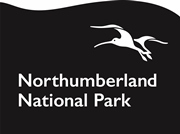
Name: Chris Jones
Job title: Historic Environment Officer
Employer: Northumberland National Park Authority
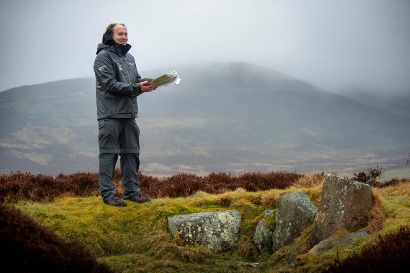
What archaeology do you have on your patch, is it more than in other National Parks or Council areas?
The UK’s National Parks are all distinctive places and all have been shaped by the interaction between people and the natural world over thousands of years. Working in a National Park you see evidence of this relationship everywhere. This includes evidence for farming, fields and forests and in more recent centuries of mining, quarrying and industrial processing.
All National Parks are different and contain a wealth of archaeology, built and cultural heritage. Northumberland is a border county, a land of hillforts, farms and fields from when people first lived in the hills and valleys, long before the Romans made it the northern frontier of their vast Empire, a land between kingdoms until only 400 years ago, a land of the legendary Border Reivers and most recently a land of agricultural innovation in sheep farming. These hillforts, Roman remains and fortified farmhouses are all unique to Northumberland.
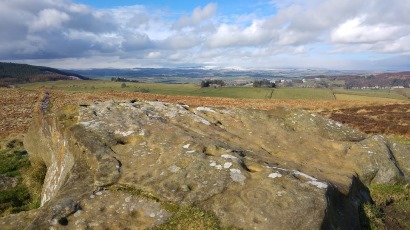
How much of your work is advice based and how much practical work do you get to do, and are you called upon as an expert for other areas of the country?
My job is about giving advice about the historic environment to colleagues, farmers and land managers, other organisations and the communities who live and work in the National Park. It includes guidance on research, interpretation and management, from helping farmers understand the significance of the archaeology on their land to helping people from anywhere engage with the rich historic environment and cultural heritage of the National Park.
I also work with colleagues to help enable volunteers, community groups and specialist contractors to undertake practical fieldwork in the research, investigation and conservation of archaeology and historic buildings. My role does allow me to visit stunning places and to help to tell the stories about people in the National Park from thousands of years ago to the present, encouraging people to actively engage with the past.
More recently I’ve led on a national pilot project (in England) repairing and restoring traditional farm buildings so that they can continue to be used by farmers in the present and for the future. I was on the national steering group and helped to assess applications for funding across other National Parks. I also work with colleagues in other National Parks and Local Authorities across the country using my knowledge, skills and experience to better protect the historic environment.
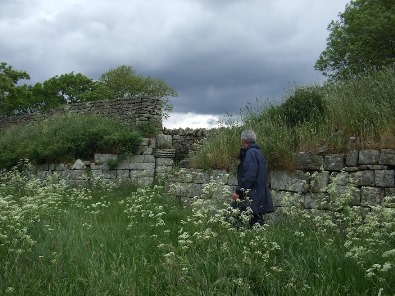
What other organisations do you and the Park work &/or collaborate with during your archaeological work?
I work with a range of partners from government agencies, universities, heritage trusts, local, national and regional societies. All my own work is done collaboratively, working with other teams (particularly the Farming, Natural Environment, Access and Ranger Teams and Engagement Team). I work with other National Park Historic Environment Officers to share ideas and best practice and colleagues in local authorities as part of a network of people working to protect, discover and connect people with archaeology and heritage.
How much do you work with the rangers and on the ground staff within the park and across other sites? What do they help you with?
The rangers play a key role in conserving and managing heritage across the National Park and engaging the public with it. This involves everything from practical repairs to historic structures, maintaining access to sites to installing interpretation panels. All our practical conservation work is led by the rangers and volunteers who help to plan, organise and deliver works including scheduled monument condition surveys to tackle heritage at risk.
What qualifications, skills and experience are needed in your role but also in the land management roles around historic sites?
I have a degree in History and Archaeology and a Masters degree in Landscape Archaeology, but you don’t have to have a degree as there are other ways to become an archaeologist. Recently there are opportunities to do an apprenticeship in archaeology and historic environment advice. There are lots of different occupations which range from field investigation, project management, advice, artefact conservation, museum curation and public engagement.
The skills needed for my job include research skills and an enquiring mind, keen observation and the ability to understand, assess, synthesise and review complex information, quite often quickly. You should be able to communicate these ideas to a range of different audiences and be able to negotiate positive outcomes with owners and managers. I need to work well on my own but equally as part of a team and provide leadership, have integrity and be open minded. Project management skills are especially important as is the ability to prioritise and manage a high workload.
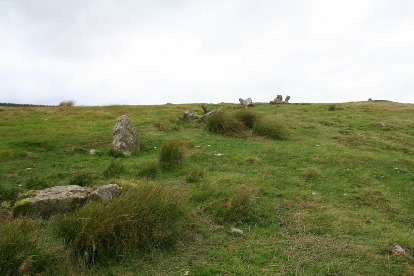
Can you offer any advice to people looking at similar roles?
It’s a fantastic job with lots of benefits, but there are few opportunities. Working in a National Park is one of the best jobs in archaeology, because you get to work in some of the most spectacular landscapes in the UK, to work collaboratively with a multi-disciplinary environment, working with a wide range of people, to make a real difference through discovering new sites or new layers of meaning to sites we already know about, to promote understanding and enjoyment of archaeology and heritage among the public and to protect archaeology for future generations to enjoy.
My advice would be for you to have an enquiring mind and a passion for discovering, protecting and, most importantly, for sharing and communicating knowledge. Volunteering is a great way of finding out about the different opportunities on offer. If you can take part in a survey or excavation, you’ll learn a lot about archaeology and there are lots of local groups who carry out research and fieldwork across the UK. Children can join a local Young Archaeologists Club branch and everyone else can volunteer to help to run a local YAC. There are opportunities to do an apprenticeship in everything from fieldwork to advice and artefact conservation, at entry level or degree level. You can contact your Local Authority Archaeologist, local archaeology group or organisations like the Council for British Archaeology for help and advice about developing a career in archaeology.
To ask Chris a question or find out more about the role please use the details below
chris.jones@nnpa.org.uk 01434 611531 / 07917284374
www.northumberlandnationalpark.org.uk
More from Northumberland National Park Authority